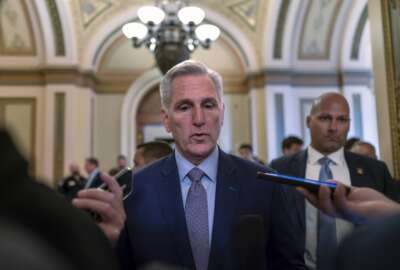Hubbard Radio Washington DC, LLC. All rights reserved. This website is not intended for users located within the European Economic Area.
One DMV congressman’s view of the ongoing shutdown showdown
The back and forth continues on whether there will be some sort of government shutdown by the end of the week. Members of Congress continue to try to find some ...
The back and forth continues on whether there will be some sort of government shutdown by the end of the week. Members of Congress continue to try to find some resolution that either everyone can live with or few enough people can’t. To gain some insight on what’s happening, Federal Drive with Tom Temin had a chance to speak with Rep. Don Beyer (D-Va.), whose district contains several thousand federal employees that could be effected.
Interview Transcript:
Tom Temin And you have a very different view of the world from some of the Republicans, and they’re divided among themselves. What could possibly resolve this? Can anybody move? There’s only one side have to move. Do you all have to move? I mean, how do you look at it?
Don Beyer Well, I think it’s pretty clear that Kevin McCarthy (R-Calif.) has tried many different ways already to get a consensus in his caucus. And really, that doesn’t mean a majority of his caucus. He’s going to get almost every one of them, because if he only gets if he misses five or six or seven, that’s the margin that he has with Democrats. That’s why he’s been unable to bring a lot of bills to the floor in the last ten days. But there is an easy solution, and that’s to go back just a few months to our almost shutdown over the debt ceiling. And when Kevin McCarthy and President Joe Biden negotiated a deal about what the top lines spending levels would be for fiscal year 2024. And everyone’s sacrifice. So a lot of people voted no from the right and the left because they weren’t happy with the compromise. But it was a compromise, it did pass both houses. It was signed by the president. It said fiscal year 2024, we’ll have the same topline numbers the fiscal year 2023 had. I know inflation has been the highest, 9% during this last year and as low as three, but certainly it’s going to cost a lot more to run government. So it’s a big moving backwards. Virtually every Democrat would vote for that budget, I think many Republicans would. That’s what’s coming out of the Senate. That’s the deal. It’s pretty clear.
Tom Temin It seems like, though, that if you just going from a mathematical basis, if all the Democrats and just you don’t need that many more of the Republicans to get it passed in the House, you don’t need two-thirds.
Don Beyer No, no, you don’t. But you do need to be able to get the bill onto the floor. And there’s no automatic way to bring a bill to the floor other than to do something called a discharge petition, where a majority of the House, 218 people have to sign their name in a little book. And when 218 is hit, then it starts a clock, and over the next couple of days the speaker has to bring that bill to the floor for a vote. It’s rarely been used. I think the last time successfully, the only time in my nine years there, was over the Export-Import Bank that everyone is for except for the chairman of the Republican House Financial Services Committee. And Christie was the chairman. He held it up and we had to literally go around him to do the discharge petition to get the vote on the floor. And then it passed easily.
Tom Temin Right. And so then that becomes the political problem that Kevin McCarthy has, which it’s really outside of anybody’s control except him and his that piece of the caucus there that has that sort of Damocles over his head.
Don Beyer We all talk about how the thing that Speaker Kevin McCarthy is afraid of is that if he compromises or is seen to compromise, that they will do something called the motion to vacate the chair, where basically they say, we’re going to vote to throw you out. My instinct is that motion wouldn’t be successful anyway, that he has nothing to fear. But I guess when the motion is should we keep our speaker or not, he’s afraid that his speakership might be short lived.
Tom Temin Right. Ok, let’s talk about the shutdown from the governmental standpoint. I mean, we’ve all lived through these things. My first experience with a federal shutdown was during the Clinton administration. And I think up till then it had been a long time. And now they seem to be regular occurrences.
Don Beyer And then, Tom, I’d point out that every time has been in a Congress controlled by the Republicans. With Newt Gingrich, twice with Donald, Trump now driven by the Freedom Caucus and Kevin McCarthy’s Republican House. That’s just a comment.
Tom Temin Right. Well, Ok. Yeah. On this show, we we don’t take sides, but that is a fact.
Don Beyer I know we don’t. It’s just the difference that, I’m trying to be fair writ large. Democrats are there because we want government to work, to be good government, to take people advance our country. And Republicans are largely there because they want to keep things the way they were. They’re the champions of the status quo. And they don’t necessarily like government. They quote all the time the government that government governs best, that governs least. So it’s very different perspectives there on spending within government.
Tom Temin Well, that gets to the question. That seems to be the real one that’s underlying this. And it’s by proxy over the relatively small portion of the budget, maybe a quarter of actual spending that is represented by the discretionary budget. That doesn’t seem to be able to be passable at the moment, and that is the rising interest rates, therefore raising the amount of federal outlays to do the debt service of a deficit and therefore a set of public debt that is rising. I mean, it’s trillions and $30 trillion and so on. And the entitlement spending is runaway. And again, this is not to say it’s good, bad, or here’s what we should do about it. But could they possibly be using this as a way to get maybe Congress in a much larger sense, to look at the fact that Treasury takes in 2 trillion a year and 6 trillion a year go as outlays or something like that?
Don Beyer Yeah, yeah, you put your finger. It’s a little complicated, but it’s also pretty straightforward. We are spending roughly 20% of GDP every year on federal government spending, and we’re raising about 16, 16 and a half percent in terms of taxes. So that four or 5% difference is our deficit. And the way you address it, number one, is you make sure that people that owe taxes pay it. Right now, you and I have a 1099 or W2, 99% of our taxes are paid fairly and on time. If your income is not coming that way, it is coming through trading stock or selling big businesses. Less than half of the actual owed taxes are paid with a couple of bills, with Elizabeth Warren, with Steve Cohen and others, to have a tax on people with net income is greater than $50 million a year. A surtax on people making more than 2 million a year won’t affect their lives at all, but it would close that gap. And then, Tom, the hard part is those automatic spending Medicare, Medicaid, Social Security and interest on the debt is 80% of the budget. Right now. 10% is our defense budget, which no one wants to touch. That means we have to find all the savings we want in the last 10%. And that’s everything else. State Department, Department of Energy, Department of Education, Customs and Border Patrol, all those things that are really important. Somehow you have to make cuts that affect a huge budget on just the last 10%.
Tom Temin Yes. And that seems to be, that’s not really possible.
Don Beyer No, No, it’s not. Which is why some of the things they’re throwing out are all dead on arrival in the Senate, and they’d be dead on arrival with the American public if they ever got that far.
Tom Temin Right. So, therefore, what do we do long term here?
Don Beyer Well, that’s a really, really important question. And it’s really interesting that the Republicans really, at the behest of Donald Trump, said we’re not allowed to look at Medicare or Medicaid or Social Security, but we should. John Larson (D-Conn.), a member of Congress from Connecticut, Democrat for years has had a bill called Social Security 2100 that would fix Social Security through the end of the century. We just had to put it on the floor, and I think it would pass. On Medicare, 31% of our Medicare budget is just dialysis, end stage renal disease. We’re not going to fix that overnight. But we need to address obesity in America. There’s so much sugar, so many processed foods that are driving up something that doesn’t have to be there. Those are decisions that we sadly make, even on Medicaid. You’re Medicaid is basically being given to people that are low income, the working poor. It’s not that hard to imagine an economy where we lift wages everywhere so that we don’t have working poor. We actually have a middle class again, and that would drive our Medicaid budget way, way down. They’re structural things we can do that would give us big surpluses in the years to come and said we’re trying to pick on, let’s zero out NASA or the Department of Energy and trying to do it that way.
Tom Temin And with respect to, just getting back to the tax issue, I mean, since Michael Dukakis ran for president, that was one of his premises. Let’s tax the people that aren’t paying what they call fair share. But you have a tax code and the tax code is supposed to reflect fair share.
Don Beyer And it clearly doesn’t. And in the number of 735 billionaires in America and their average tax rate last year was 8%. I promise you, yours and mine is probably somewhere in the mid-thirties.
Tom Temin What’s your message to federal employees who’ve got to live with this, who are for the most part dedicated public servants that just want to go to work?
Don Beyer Well, first, God bless you and thank you. And I am so sorry. You’re having to put up with this. That this sort of Damocles, this anxiety hanging over your head that we may shut down in just a couple of days. Ultimately, you federal employees will get paid, but you’re not going to get paid right away. And I don’t know who’s going to pay your mortgage or your child care bill or put groceries on the table. Thank you for being patient, thank you for being resilient. And for the federal contract workers, of whom there are many, many, they’re never going to get paid. And they’re just throwing them under the bus. And it’s very sad. So all I can tell you is we will try to do everything we possibly can to pump up the non-profits and state and local governments to try to get you through this.
Copyright © 2024 Federal News Network. All rights reserved. This website is not intended for users located within the European Economic Area.
Tom Temin
Tom Temin is host of the Federal Drive and has been providing insight on federal technology and management issues for more than 30 years.
Follow @tteminWFED
Related Stories
Government shutdown survival tips from someone who’s been through them
Related Topics
Related Stories
-
Government shutdown survival tips from someone who’s been through them Government Shutdown
-
There’s only one question before Congress, at least this week Government Shutdown





